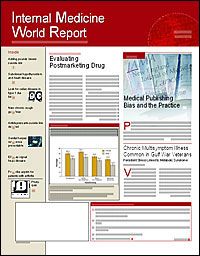Publication
Article
Internal Medicine World Report
When Is Colorectal Cancer Screening Appropriate in the Elderly?
Whether colorectal cancer (CRC) screening should be recommended to adults aged >=70 years is not a question that can be easily answered. The issue is not even addressed in current CRC screening guidelines. A new study published in Gastroenterology (2005;129:1163-1169) may offer physicians some guidance on the matter.
Although the benefits of CRC screening among younger populations are well established, screening in the elderly is controversial for several reasons, including their shorter life expectancy and greater risk for complications. A dearth of clinical research contributes to the "uncertainty about the necessity of cancer screening in the elderly population," according to investigators Cynthia W. Ko, MD, of the Department of Medicine, University of Washington, Seattle, and Amnon Sonnenberg, MD, MSc, of the Department of Medicine, Oregon Health and Science University, Portland.
This study included patients aged 70 to 94 years who were in various states of health and looked at the risks and benefits of CRC screening using 3 techniques: annual fecal occult blood testing (FOBT), flexible sigmoidoscopy every 5 years, and colonoscopy every 10 years.
There was considerable variation in the potential benefits of screening, based on age, life expectancy, and screening method. One cancer-related death could be prevented by screening 42 healthy men aged 70 to 74 years with colonoscopy, 178 healthy women aged 70 to 74 years with FOBT, 431 women aged 75 to 79 years in poor health with colonoscopy, or 945 men in average health with FOBT. Although colonoscopy afforded the greatest benefits, it was also fraught with the most complications.
Risks associated with flexible sigmoid?oscopy never outweighed its potential benefits, but the potential complications of FOBT were deemed to cancel out its advantages in women aged 70 to 74 years who were in poor health.
The risks of screening colonoscopy were judged to outweigh its benefits in the following subgroups:
? Men aged 70-74 years in poor health
? Men aged 90-94 years in good health
? Women aged 75-79 years in poor health
? Women aged 85-89 years in average health.
However, at all ages and life expectancies, the potential reduction in mortality from screening outweighed the risk of colonoscopy-related death.
"For any individual patient, the potential for harm from screening must be weighed against the likelihood of benefit, especially with shorter life expectancy," the investigators wrote.
Commenting on this article in the same issue of Gastroenterology (pages 1342-1344), Carmen Lewis, MD, of the Department of Medicine, Univer?sity of North Carolina at Chapel Hill, noted that this study helps fill a wide gap. The American Geriatrics Society's "guidelines support individualized decision making for colon cancer screening in the elderly and put the onus on physicians to deter-mine who is likely to benefit from screenings and who is not." Dr Lewis concluded that this information should be used "as an aid to help inform patients about the risks and benefits of colon cancer screening, and then with their physicians, patients can explore their personal values and make the decision that is right for them." ?R.M.






